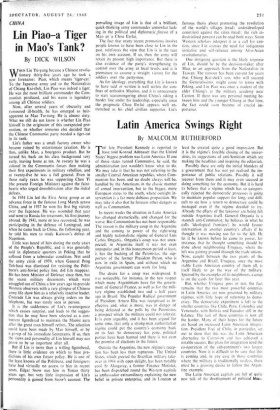CHINA
Lin Piao-a Tiger in Mao's Tank?
By DICK WILSON
WHEN Lin Yu-yung became a Chinese revolu- tionary thirty-five years ago he took a new forename: Piao, which means 'tiger-cat.' To the Japanese army and to the Nationalists of Chiang Kai-shek, Lin Piao was indeed a tiger. He was the most brilliant commander the Com- munists produced, and his name is legendary among all Chinese soldiers.
Now, after several years of obscurity and rumoured ill-health, he has emerged as heir- apparent to Mao Tse-tung. He is almost sixty. What we still do not know is whether Lin Piao himself is the originator of this unexpected pro- motion, or whether someone else decided that the Chinese Communist party needed a tiger-cat in its tank.
Lin's father was a small factory owner who became ruined by extortionate taxation. He is thus, unlike Mao, a bourgeois product. But he turned' his back on his class background very early, leaving home at ten. At twenty he was a colonel in the Communist forces then making their first experiments in' military rebellion, and at twenty-five he was a full general. Even in those early years he was supporting Chen Yi (the present Foreign Minister) against the faint- hearts who urged demobilisation after the initial defeats.
In 1934 Lin led the First Army group as an advance force in the famous Long March across China, and in 1937 he won his first big victory over the Japanese. He was wounded that year and went to Russia for treatment, his first journey abroad. By 1941, more or less recovered, he was participating in the defence of Leningrad, and when he came back to China, the following year, he told his men to study Kutusov's defeat of Napoleon.
Little was heard of him during the early years of the People's Republic, and it was generally said in diplomatic quarters in Peking that he suffered from a tubercular condition. Not until the army crisis of 1959, when General Peng Teh-huai was dismissed for resisting the Polit- buro's anti-Soviet policy line, did Lin reappear. He has been Minister of Defence since then, but the secret military documents which were smuggled out of China a few years ago to provide Western observers with 4 rare glimpse of Chinese army life show him as a relatively inactive leader. Comrade Lin was always giving orders on the telephone, but was rarely seen in person.
It is the suddenness of Lin's re-emergence which causes surprise, and leads to the sugges- tion that he may have been selected as a con- venient figurehead to maintain the Maoist aura after the great man himself retires. The selection could have been made by Mao himself, or by a group of his immediate lieutenants. If so, then the views and personality of Lin himself may not prove to be so important after all.
But if Lin is more than a willing figurehead, there is little evidence on which to base pre- dictions of his own future policy. He is one of the least known of the Politburo, and foreigners have had virtually no access to him in recent years. Edgar Snow met him in Yenan thirty years ago, but very little impression of Lin's personality is gained from Snow's account. The prevailing image of Lin is that of a brilliant, quick-thinking army commander somewhat lack- ing in the political and diplomatic finesse of a Mao or a Chou En-lai.
The fact that many recent promotions involve people known to have been close to Lin in the past, reinforces the view that Lin is in the race on his own account. If so, then the army will retain its present high importance. But there is also evidence of the party's strengthening its control over the army at local levels, and it is premature to assume a straight victory for the soldiers over the party-men.
As for ideology, everything that Lin is known to have said or written is well within the con- fines of orthodox Maoism, and it is unnecessary to start scaremongering about China's taking a harder line under his leadership, especially since the pragmatic Chou En-lai appears well en- trenched as his chief civilian supporter. Lin's famous thesis about promoting the revolution of the world's villages (read: underdeveloped countries) against the cities (read: the rich in- dustrialised powers) can be read both ways. Some Western scholars interpret it as a call for cau- tion, since Lin stresses the need for indigenous initiative and self-reliance among Afro-Asian revolutionaries.
One intriguing question is the likely response of Lin, should he be the decision-maker after Mao, to an approach from the Nationalists in Taiwan. The rumour has been current for years that Chiang Kai-shek's son, who will succeed the Generalissimo, might come to terms with Peking, and Lin Piao was once a student of the elder Chiang's at the military academy near Canton. If there was any personal meeting be- tween him and the younger Chiang at that time, the fact could soon become of crucial im- portance.






























 Previous page
Previous page